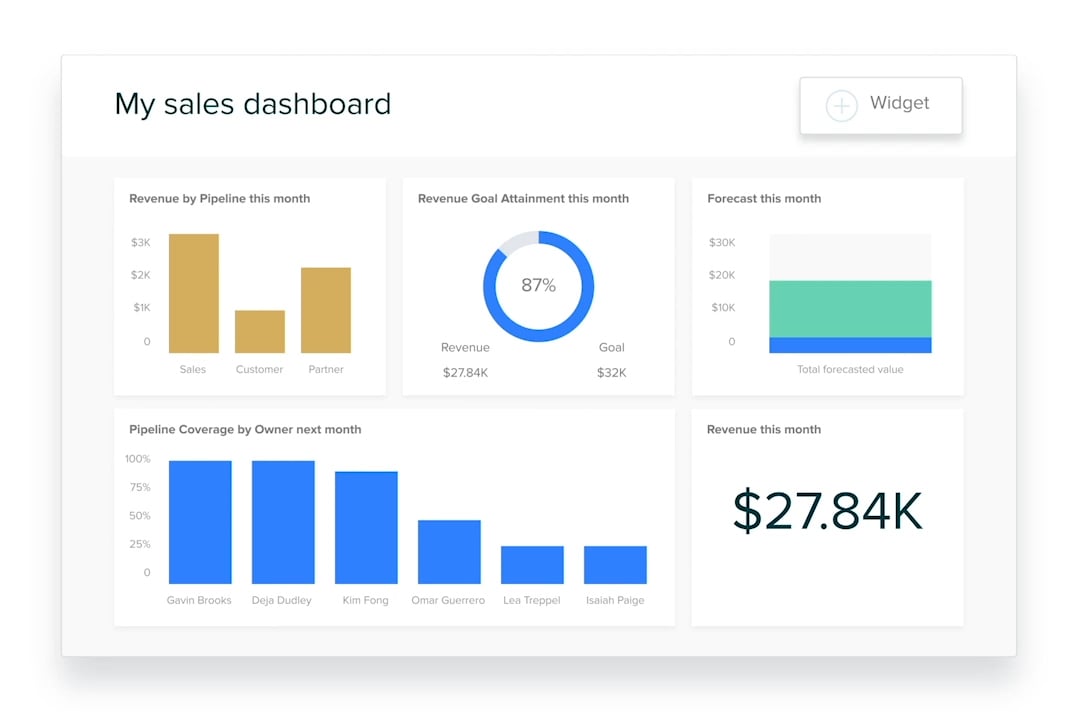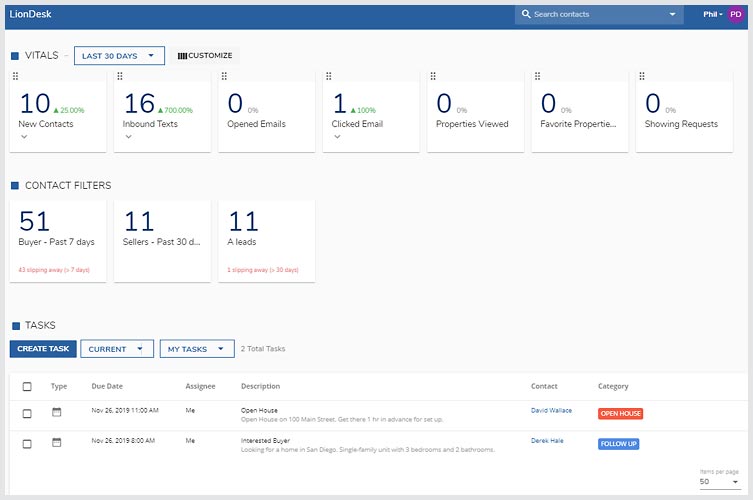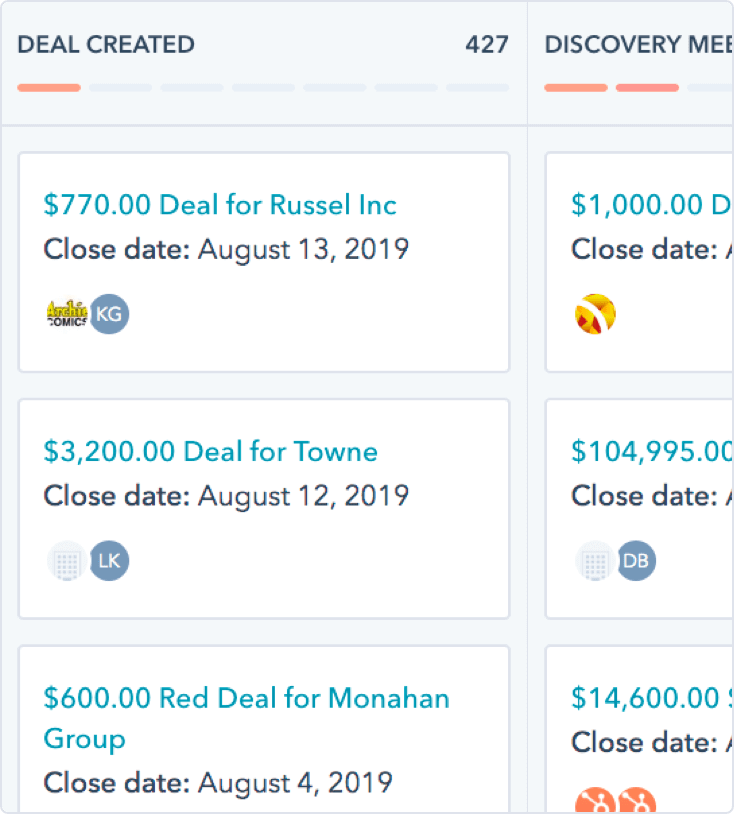Real estate CRM
Relationships close big deals. That makes CRM platforms are invaluable for real estate sales.
上次更新日期: November 20, 2023
CRM use in real estate sales
Like other sales organizations, real estate companies need a CRM to keep track of prospects, manage the sales pipeline, and take advantage of powerful data analytics.
- What is real estate CRM?
- Real estate CRM features
- Summary of the best real estate CRMs
- 6 best CRMs for real estate professionals
- Benefits of using a CRM in real estate
- Try automating your real estate sales for free
What is a real estate CRM?
Customer relationship management (CRM) software might not immediately bring to mind real estate professionals, but make no mistake, they’re salespeople, too. And like sales reps everywhere, real estate professionals need software that will help them work more efficiently.
Real estate CRM solutions include SaaS offerings tailored specifically to the industry, but the best CRM for real estate isn’t necessarily one designed for realtors. As we’ll explore in this article, real estate CRM means any modern sales platform that offers automation, pipeline management tools, rich data analysis, and a host of other features that make prospecting and closing deals easier.
Real estate CRM features
No matter which kind of property your firm specializes in—residential, commercial, industrial, raw land, or special use—your realtors will need a real estate CRM that provides a wide range of features. From lead generation and prospecting to contact management and analytics, the best CRM for real estate will make every part of your realtors’ workstream more efficient and effective. When choosing a CRM for your team, ensure that the solution you purchase offers a high degree of customization, which will enable you to fine-tune the platform for maximum effectiveness.
Also, CRM automation should be a bedrock feature, since the whole point of using a CRM is to reduce time-consuming tasks that eat into a reps’ time talking to prospects. Automated tasks can include scheduling follow-up emails, appointment reminders, and email templates (and personalization) that can reduce the noise so your team can focus on more important work.
In the following section, we’ll take a closer look at some common features of real estate CRMs and explore how they can help your firm close more deals.
Lead generation and prospecting
One of the strongest features of real estate CRM software is its sales engagement tools—specifically the ones that enable your team of realtors to quickly create lead lists and automate outreach. Real estate professionals work best when they’re not mired in time-consuming tasks like manually building lead lists or chasing down prospects with inaccurate contact information.
When choosing a real estate CRM, be sure that it comes with a built-in option to add more prospects to your list. That’s a huge time-saver, and it’s an especially powerful tool when coupled with a CRM’s ability to filter those prospects into targeted lead lists.
Be sure to look for real estate CRM software that offers customizable email templates, touch-point cadences, and smart lists. The templates will save realtors time, and the touch-point cadences will ensure that you’ll follow-up with prospects at the right time. Meanwhile, smart lists will help you organize the leads you’re working—for example, you should be able to create a list by industry or geography.
Pipeline and funnel management
First thing: the era of managing the sales pipeline through spreadsheets is over (or at least it should be). The best CRM for real estate will feature pipeline management tools that take huge amounts of data and conveniently display it in easy-to-understand visuals, and then guide sales reps toward next steps. It’s an essential feature that helps real estate professionals close deals, track emerging trends, and ultimately bring in more revenue.
Here’s where sales acceleration software (such as a CRM) shines. It takes the standard sales process—prospecting, qualifying, presenting, quoting, closing, and win/loss analysis—and streamlines it, making each step move a little faster and easier. Pipeline tools offer a host of automation options, and research has shown that sales teams that lean into automation tend to see quick ROI, often within six months.
By implementing a CRM’s pipeline management features, you should see the following results:
- A boost in sales acquisition
- Decreased time spent on lead management
- A complete view of the sales funnel
- More effective sales engagement efforts
- Actionable sales data at your fingertips
- Better efficiency through productivity tools for sales teams
Contact management
Having robust pipeline management tools is all well and good. But when it comes time to reach out to a prospect, real estate professionals must have accurate contact information. A real estate CRM needs to provide your team with the ability to organize and update contact information, and crucially, that database has to be accessible remotely.
That last point bears repeating: real estate professionals are often on the go. They’re frequently out of the office meeting clients to tour properties, and no realtor wants to head back to the office just to find a phone number or email address. A contact management platform does more than help you organize your client database and offer remote accessibility—it also provides vital context about your prospects. That can include factors such as age, industry, location, and other demographic information, but importantly, it will also cover past interactions with your business.
Analytics and reporting
No real estate CRM can be effective without analytics and reporting features. Real estate professionals need data that can help them optimize their sales process, provide better service, and be able to predict sales performance in the future. That said, there are a lot of subtle variations in analytics and reporting. Let’s explore a few of the various terms and what they can mean for your real estate business.
Sales intelligence. This covers a lot of ground: sales data, the technology that captures that information, and how that data is analyzed and used. Sales intelligence capabilities might be native to the CRM you choose, but if they aren’t, chances are the system will integrate with a third-party tool. Think of it this way: sales intelligence provides context, which informs lead generation and qualification, can help create more accurate buyer personas, and point the way toward shorter sales cycles and improved sales performance.
Sales reporting software. This falls under the term sales intelligence, and at its heart is a basic task: it generates sales reports for your team. A sales analytics platform, for example, uses AI to gather sales data and then synthesize that information into reports that offer clear, actionable insights. Pipeline and funnel analysis, sales forecasting, revenue, performance, and customer interactions: an effective real estate CRM will provide sales reporting features that make these reports easy to generate.
Meanwhile, CRM analytics can illuminate customer trends—for example, at which sales stage leads are most likely to drop out, how long they tend to stay in a particular stage, and so on. These analytics can also shed light on lead and deal source performance as well as how each realtor is performing.
Customization (integrations, marketing)
When choosing a CRM for your real estate business, going with a customizable CRM will likely be your best bet. Sure, you could opt for a prohibitively expensive custom CRM tailored specifically to your business, but the best CRM for real estate is already out there. The question is, which one?
Any CRM worth its price will enable seamless integrations with your existing tools. That might include marketing applications such as MailChimp, file sharing services such as Dropbox, or the ubiquitous productivity suites offered by Google and Microsoft. Or perhaps you want to put a lead capture form on your real estate firm’s Facebook page or sync PandaDoc to your CRM.
In any event, a good practice before choosing a CRM is to conduct a detailed analysis of all the software services employed by your realtors.
Meanwhile, it’s also important that your real estate CRM offers customizable fields, reports, and dashboards. A good real estate CRM will provide a host of standard features that you can tweak for maximum effect.
A summary of the best real estate CRMs
Real estate CRM software | Starting price | Free trial? | Features |
|---|---|---|---|
Zendesk |
$19/per user (Team); $55/per user (Growth); $115/per user (Professional) |
14 days |
|
Follow Up Boss |
$69/per user (Grow); |
14 days |
|
Wise Agent |
$32 (monthly); |
14 days |
|
LionDesk |
$99 (starter); |
Limited number of texts and emails |
|
Hubspot |
$45 monthly (Starter: 2 users, $23 per additional user); |
14 days |
|
Propertybase |
$69/user (Company); |
Demo only |
|
6 best CRMs for real estate professionals
- Zendesk Sell
- Follow Up Boss
- Wise Agent
- LionDesk
- Hubspot
- Propertybase
Zendesk Sell

Zendesk Sell is a powerful option for those looking to harness the power of a real estate CRM. Besides its extensive lead generation capabilities—it offers targeted lead lists culled from millions of businesses—Sell empowers realtors with automated email sequences, customized email templates, and touch-point cadences.
Building off those automation tools, Sell also provides robust pipeline management features that help real estate professionals work smarter. Its automatic lead tracking simplifies how and when realtors contact prospects, helps with tailoring buyer personas, and sheds light on customer behavior that can make it easier to close deals.
Meanwhile, Sell’s contact management features ensure that realtors have the right contact information at their fingertips while making it easy to reach out to potential clients. And while those real estate agents are reaching out to prospects, team leaders get access to sales dashboards and reports that clearly show how each realtor is performing and areas for improvement.
Crucially, Sell was designed to integrate seamlessly with common productivity tools such as MailChimp, Google, and Dropbox while also offering a host of apps in the Zendesk Marketplace. Endlessly customizable and easy to use—including its award-winning mobile app—Sell can be tailored to fit your business needs, no matter which type of properties your firm specializes in.
Follow Up Boss
.png)
Followup Boss is a real estate CRM that pulls leads from hundreds of sources, such as Facebook, Zillow, and Realtor.com. The system is designed to automatically assign leads to realtors while helping them manage communication via automatic reminders—ensuring that emails and phone calls happen at the right time—while also capturing all inbound calls.
The CRM also integrates natively with Google and Office 365 and syncs with agents’ Google calendars while offering an app for both Android and iOS for when agents are in the field rather than the office.
Other features include:
- Pre-written drip campaigns and action plans
- Smart lists
- Support services seven days a week
Wise Agent
.png)
Designed to be simple to use, Wise Agent includes contact management and lead automation features, as well as transaction management tools that give realtors a clear checklist of steps needed to ensure that a deal successfully closes.
Wise Agent also has marketing tools, which includes flyer templates, email automation, drip campaigns, newsletters, and texting functionality.
Other features:
- Commission reports
- Landing pages
- Time management tools
- Integrations with tools such as Zapier and Google
LionDesk

LionDesk’s real estate CRM has transaction management functionality that’s meant to improve communication between relevant parties and remove roadblocks that could prevent a deal from closing. It features lead generation capabilities with custom or pre-built audience lists, as well as tools for advertising property listings.
LionDesk also comes with a power dialer that helps real estate professionals reach out to prospects quickly and efficiently. It also has out-of-the-box integration with popular real estate tools such as Zillow, realtor.com, and Facebook.
Other features:
- Multi-channel marketing campaign builder
- Automated client communication
- Contact management
Hubspot

Hubspot’s CRM offers real-time sales dashboards and pipeline management features, as well as lead generation and deal tracking options. The free version also comes with email tracking functions to help real estate agents set up timely follow-up messages, prospect tracking, a meeting scheduler, and live chat functionality.
Users who want more features can switch to the paid Enterprise version, which includes these other tools:
- Marketing automation
- Sales automation
- Sales analytics
Propertybase

This real estate CRM was built to centralize leads and make it easier to route them to reps, while also automating outreach with personalized emails. Propertybase integrates with the major MLS services and offers campaign benchmarking and website analytics.
The CRM by Propertybase comes in two versions: Go (ideal for smaller firms) and the Salesforce edition (which includes lead generation, marketing automation, and other advanced features, best for larger firms).
Other features include (Salesforce edition):
- Transaction management
- Website creation
- Third-party tool integration
Benefits of using a CRM in real estate
Whether you’re dealing with private buyers and sellers in the residential market or brokering real estate trades for large corporations, a CRM platform (or a B2B CRM for those dealing with commercial and enterprise businesses) will play a critical role in generating revenue. The real estate market is hyper-competitive, and your customers—buyers and sellers—expect personalized, efficient interactions with your agents.
Think of it like so: the road to a successful deal is littered with obstacles and detours. What a real estate CRM does is allow your agents to avoid many of those pitfalls so they can close more deals. A real estate CRM will provide essential analytics so you can identify where your agents are succeeding and where they need to improve, which will allow your business to adjust to changing market conditions while maximizing your team’s efficacy.
Try automating your real estate sales for free
With Zendesk Sell, you’ll get an easy-to-use, robust CRM that will make automating the most time-consuming tasks a snap. With its award-winning mobile app, powerful analytics capabilities, and rich ecosystem of integrated third-party applications, Sell makes it easy for real estate professionals to minimize grunt work so they can focus on customer relationships.
From marketing automation to lead generation to contact management, Sell boosts efficiency, provides much-needed visibility into what’s working (and what isn’t), and leads to increased revenue.
There's more where that came from.
Here are some more helpful CRM resources.
